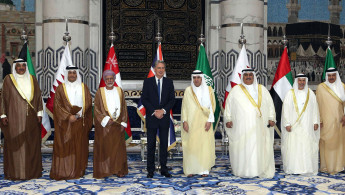'Britain's relations with Arab world unaffected by Brexit'
Britain’s role on the international stage will not be diminished and its relationship with the Arab world will be unaffected, a British MP told The New Arab, as the country comes to terms with the results of an EU referendum on Friday.
The United Kingdom will maintain its position globally despite the shock result leading to the end of its relationship with the European Union, according to the Parliamentary Under Secretary of State for the Foreign and Commonwealth Office, Tobias Ellwood.
"Our aid budget is one of the largest in the world, and when it matters, we step up," he said, noting the UK's role in the "coalition now fighting Daesh – Britain is at the forefront of that."
"Our role, our leadership, not least with the Middle East, where we have such strong relationships, will continue."
'Cross-party unity'
But the announced resignation of David Cameron just hours after the results poses a question on the country's upcoming foreign policy towards the Middle East - a region which is not only politically but economically attached with billions worth of investments and trade deals.
"I don’t see this changing at all, there is cross-party consensus in this regard because it's so strong and it's at every level," Ellwood said referring to the British relationship with the Middle East.
"It's at the grassroots level on factory floors, a military level and between our monarchies as well who have very strong relationships – any prime minister of any party will continue to recognise that," the Conservative MP maintained.
"We are aware of the sovereign wealth funds that are spent here – those conditions will not change, in fact, those conditions were created quite separately from the EU to allow us to be attractive not just for the Middle East, but for other countries around the world to invest in Britain."
The rise of the far-right
Controversy surrounded the winning Leave campaign which many accuse had used scaremongering tactics and xenophobia to rile up fear among voters in Britain, with thousands anticipating a rise of the far-right following Britain's exit from the EU.
Calls by far-right leaders in France and the Netherlands for their countries to hold their own votes on EU membership almost immediately followed with French far-right leader Marine Le Pen describing the development as a "victory for freedom".
However, the rise in the far right is due to political parties "not listening to the people," according to Ellwood who believes "this is a major wakeup call for Austria, Germany and France as well, to say let's make sure that the European Union modernises as quickly as possible. Otherwise we will see a rise in extremism."
Nonetheless, the MP admits "immigration played a big role in the decision making – people blamed the European Union for not being able to control what was going on, for not being able to see the numbers of people that were actually coming across."
Rocky times ahead
Earlier on Friday the stunned European Union vowed to remain united despite Britain's decision to leave as fears grew that a "chain reaction" of further referendums could tear the bloc apart. Signs that Britain would find negotiating a new relationship with the EU difficult emerged as the head of the main centre-right group in the European Parliament, Manfred Weber, warned that Britain should not expect an easy ride.
"Exit negotiations should be concluded within 2 years at max. There cannot be any special treatment. Leave means leave."
However, Ellwood insisted Britain's military would keep its relationship with the EU strong, suggesting "we have the biggest armed forces in the whole of Europe – the Europeans know that and they want to keep us involved. We have this can-do attitude which will make this work."
As millions across the region anticipate what's to come, officials including the governor of the Bank of England as well as Prime Minister David Cameron assured "there will be no changes, no changes whatsoever until the negotiation comes in," Ellwood said quoting the PM.
"The movement of people, business and the transfer of monies and so forth – nothing will change. The first step needs to be a confirmation by the other 27 members and that will take a little bit of time. But it is important that businesses don’t do anything rash," he warned.



